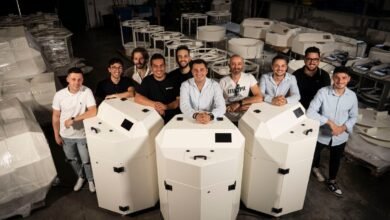Humanoids, AVs & Beyond: AI Hardware’s Future at Disrupt 2025

▼ Summary
– TechCrunch Disrupt 2025 will take place from October 27 to 29 at Moscone West in San Francisco, gathering over 10,000 startup and VC leaders.
– A key session will focus on the future of AI hardware, featuring live demonstrations of robotics and autonomous systems.
– Raquel Urtasun of Waabi and Jeff Cardenas of Apptronik will discuss integrating AI into physical systems like autonomous vehicles and humanoid robots.
– The conversation will cover the simulation, sensors, and software required to scale these technologies safely and overcome current bottlenecks.
– This session will explore how AI deployment in the physical world impacts industry, labor, and infrastructure, with registration open until September 26 for discounted rates.
This October, the future of artificial intelligence hardware takes center stage at TechCrunch Disrupt 2025 in San Francisco. Moscone West will host over 10,000 innovators and investors for three days of intensive exploration into robotics, autonomous systems, and the physical machines set to redefine our world. One of the most anticipated sessions will feature leaders from Waabi and Apptronik, offering a rare glimpse into the next wave of AI-driven hardware.
While artificial intelligence continues to transform digital landscapes, its integration into physical systems represents the next great frontier. This session brings together Raquel Urtasun, founder and CEO of Waabi, and Jeff Cardenas, co-founder and CEO of Apptronik, for a dynamic discussion on embedding intelligence into motion. Their expertise spans autonomous vehicles and humanoid robotics, two fields where theoretical AI meets the uncompromising laws of real-world physics.
The conversation will delve into the sophisticated architectures that enable machines to perceive, decide, and act autonomously. Key topics include the role of advanced simulation environments, sensor fusion technologies, and the software frameworks required to deploy these systems safely and at scale. Both companies are known for tackling some of the most difficult challenges in robotics, from perception in unpredictable environments to dynamic movement and decision-making under uncertainty.
What makes this discussion particularly relevant is its focus on practical deployment. Moving AI from code to concrete action involves unique hurdles, energy efficiency, mechanical reliability, safety assurance, and societal integration. Attendees can expect a frank assessment of both recent advancements and persistent obstacles that will shape the coming decade of intelligent machines.
The implications extend far beyond technology itself. As humanoid robots and autonomous vehicles become more capable, they promise to transform sectors like manufacturing, logistics, transportation, and even domestic services. This session will address not only how these systems work, but what their proliferation means for industries, workforce dynamics, and urban infrastructure.
Join Raquel Urtasun and Jeff Cardenas on the AI Stage at TechCrunch Disrupt 2025, running from October 27 to 29. Registration is now open, offering early access pricing until September 26. This is an opportunity to learn from and network with leading figures in AI hardware, a field poised to change how we live and work.
(Source: TechCrunch)





